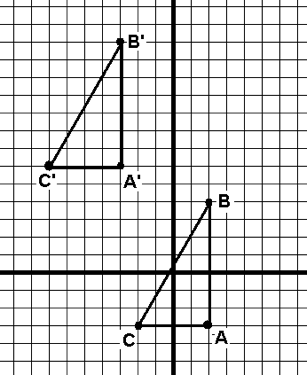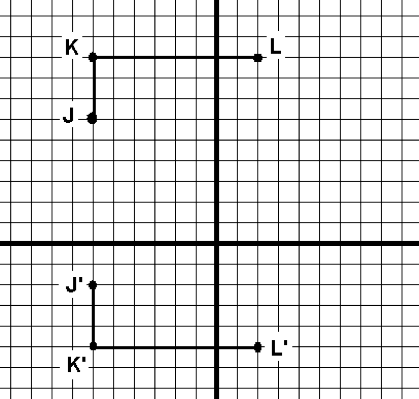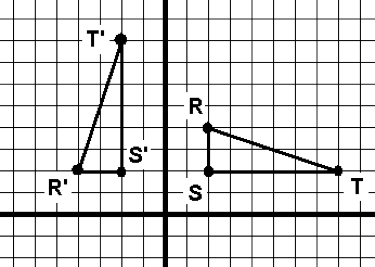Given triangle ABC: A(2, 5) B(6, -9) C(-3, 8)
Give coordinates when translated to the left 8. Label points A' B' C'
A'(-6, 5) B'(-2, -9) C'(-11, 8)
Given triangle ABC: A(3, 6) B(-7, 5) C(-4, -1)
Give coordinates when reflected over the y-axis. Label points A' B' C'
A'(-3, 6) B(7, 5) C(4,-1)
Given triangle ABC: A(-10, -4) B(-8, 14) C(0, 5)
Give coordinates when rotated 180o counter-clockwise. Label points A'B'C'
A'(10, 4) B'(8, -14), C'(0, -5)
Given triangle ABC: A(9, -2) B(7, 11) C(-4, 8)
Give coordinates when dilated by a factor of 3. Label points A'B'C'
A'(27, -6) B'(21, 33) C'(-12, 24)
The transformation created by flipping over a line.
What is Reflection
Given triangle ABC: A(2, 5) B(6, -9) C(-3, 8)
Give coordinates when translated down 22. Label points A' B' C'
A'(2, -17) B'(6, -31) C'(-3, -14)
Given triangle ABC: A(3, 6) B(-7, 5) C(-4, -1)
Give coordinates when reflected over the x-axis. Label points A' B' C'
A'(3, -6) B'(-7, -5) C'(-4, 1)
Given triangle ABC: A(-10, -4) B(-8, -14) C(0, 5)
Give coordinates when rotated 90o clockwise. Label points A'B'C'
A'(-4, 10) B'(-14, 8) C'(5, 0)
Given triangle ABC: A(9, -2) B(7, 11) C(-4, 8)
Give coordinates when dilated by a factor of 1/2. Label points A'B'C'
A'(4.5, -1) B'(3.5, 5.5) C'(-2, 4)
The transformation created by sliding a figure at a fixed distance.
What is Translation
Given triangle ABC: A(2, 5) B(6, -9) C(-3, 8)
Give coordinates when translated to the right 13 and down 18. Label points A' B' C'
A'(15, -13) B'(19, -27) C'(10, -10)
Given triangle ABC: A(3, 6) B(-7, 5) C(-4, -1)
Give coordinates when reflected over the line y=x. Label points A' B' C'
A'(6, 3) B'(5, -7) C'(-1, -4)
If you rotate a figure 90o clockwise will the image end up at the same coordinates if you rotate it 270o counter-clockwise?
What is Yes
Given the coordinates of triangle ABC and triangle A’B’C’:
A(-3, 3) A’ (-1, 1)
B (-6, 0) B’ (-2, 0)
C (9, -3) C’ (3, -1)
What type of transformation is this?
What is Dilation
The original figure.
What is Pre-image
Given triangle ABC: A(2, 5) B(6, -9) C(-3, 8)
Give coordinates when translated to the left 5 and up 11. Label points A' B' C'
A'(-3, 16) B'(1, 2) C'(-8, 19)
Given triangle ABC: A(3, 6) B(-7, 5) C(-4, -1)
Give coordinates when reflected over the line y=-x. Label points A' B' C'
A'(-6, -3) B'(-5, 7) C'(1, 4)
If you rotate a figure 180o and then reflect it across the y-axis will the image end up at the same coordinates if you reflect it across the y-axis and then rotate it 180o?
What is Yes
Given the coordinates of triangle ABC and triangle A’B’C’:
A(-3, 3) A’ (-1, 1)
B (-6, 0) B’ (-2, 0)
C (9, -3) C’ (3, -1)
Write the rule for the transformation
(x, y) -> (1/3x, 1/3y)
The ability for a figure to flip onto itself or rotate onto itself.
What is Symmetry
Give the single transformation that moved ABC to A'B'C'.

Translate left 5 and up 9
Give the single transformation that moved JKL to J'K'L'.

Reflect across y=2 line
Give the single transformation that moved RST to R'S'T'.

Rotate 90o counter-clockwise
Given the coordinates of triangle ABC and triangle A’B’C’:
A(-3, 3) A’ (-1, 1)
B (-6, 0) B’ (-2, 0)
C (9, -3) C’ (3, -1)
Will the figures be congruent? Explain.
Reflections, rotations, and translations are this because the pre-image and image are congruent.
What is Rigid Motion